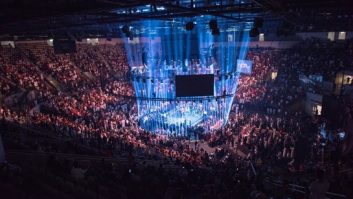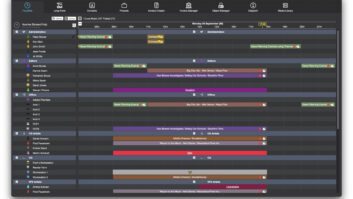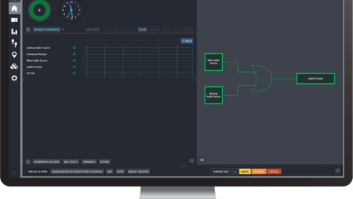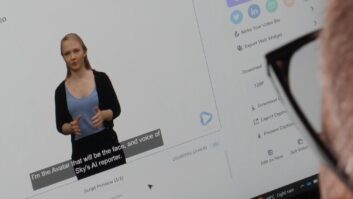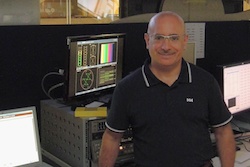
Mike Clark visited Mediaset in Milan, using a Dalet system for the first time, to find out how it has transformed the broadcaster’s news operation.
At Mediaset, Italy’s largest commercial broadcaster, just three months after launching the first stage of an impressive project to centralise and streamline its entire TV news operations, executive staff involved in the choice of the system give an insight into preparations prior to the switchover and advantages already brought by the system’s production tools, metadata management and automation features.
From a technical point of view, the Mediaset system is without doubt one of the most advanced and complex: two mirrored systems – main and back-up – are in place, both of which are totally redundant.
Mauro Cassanmagnagono (pictured), Videotime deputy general manager, Department of Research and Engineering, Mediaset, explains: “A team of key staff from Mediaset’s technical division (Videotime) and its news departments, including Andrea Delogu, RTI deputy general manager News Mediaset, and news programme directors, began discussing the project in January 2010, assessing organisation and technical aspects. These were complicated, as they involved planning a workflow based on a completely new structure – our News Mediaset Agency, which had to be able to send contents to the various channels of our news networks – Canale 5’s Milan TG5 newsroom, Studio Aperto and TG4 (Rete Quattro’s news programme), and obviously taking into consideration TGCOM24, our all-news channel, scheduled to be launched at the end of November.
“This was definitely one of the most complicated projects all of us had worked on, particularly as we had to study a system to be used by hundreds of staff accustomed to years of work based on a different modus operandi. A great deal of time was therefore dedicated to training, not only on the use of the new product, but also on the innovative news set-up.”
Mediaset partners
The ground-breaking multimedia News Mediaset Agency is under the direction of Mario Giordano, a staunch supporter of cutting-edge technology in newsrooms since the years in which he was at the helm of Studio Aperto. At present the Dalet Enterprise Edition system is used by Studio Aperto and the News Mediaset Agency (connected via fibre optics with the other Milan locations, Rome and the Mediaset’s ten regional locations, strategically positioned all over Italy, from Venice and Genoa to Sicily). In coming months, the Dalet system will also offer opportunities for other areas of Mediaset’s ‘information’ coverage, such as its ‘soft news’ and sports programmes.
The partners chosen by Mediaset for this far-sighted project were Media Power, Dalet’s Genoa-based partner and systems integrator, whose staff (led by President & CEO Marcello Dellepiane) worked closely with Dalet on designing and deploying the MAM platform able to manage the complex system, Direct Data Networks (for storage, already used by Mediaset) and Quantum (leader in the file system sector for news applications).
Videotime General Manager Sandro Costa continues: “The Dalet system’s open architecture enables us to acquire material from both traditional sources, as well as from the web or new media (tlc with solid memory, mobile phones, tablets…). It also has an on-board workflow that supports the entire journalistic/production process in a fluid integrated manner. These features, combined with an appropriate upgrade of in-house organisation, have enabled us to increase production efficiency and effectiveness — increased productive volume with the same resources and prep speed.”
Explaining how the system has changed the broadcaster’s newsgathering and editing work, Videotime deputy general manger Andrea Ronchetti adds: “Dalet’s platform enables editorial content to be acquired from any source and put at users’ disposal in real time, as well as being easily distributed via various channels and platforms. This work environment is definitely a good match for Mediaset’s complex news set-up, with various news programmes and production sites.
“Dalet also offers new prospects in content production, simplifying integration of content acquired with conventional traditional means and footage produced in-house, and between content arriving from our networks and footage acquired from organisations or individuals (videos recorded with mobile phones, DVDs, USB sticks, etc.). This results in an end product that, as well as being well as being more varied, is also more interactive, composite and up to date.”
“We hadn’t used Dalet products in the past,” continues Cassanmagnago, “in fact it was initially an outsider. But after analysing the company’s presence on the market, its capacity and its use by other clients whose requirements were in part similar to Mediaset’s, rather than choosing a technology we were already familiar with and didn’t require much training, our work group chose the system able to meet the criteria of an innovative project that looked ahead, was flexible and could be expanded and upgraded to match our future integration requirements.”
Ronchetti adds: “The new system connects all Mediaset’s editorial and production locations in real time, almost eliminating the very concept of a newsroom as a physical location in which news is prepared and divulged — creating a single fully integrated editorial set-up that is in fact spread over the entire country.”
He explains how the news production area underwent in-depth reorganisation to make the most of the new system’s potential: “Integration is the keynote of production structures and processes. Each of the two production centres — Rome and Milan — now has an Operations Centre controlling and coordinating in-house and external production activity. The integration of all this work enables us to increase our effectiveness and improve efficiency (costs, logistics. etc.), compared to the previous situation in which this work was spread over various sectors.”
Ingest time
The system enables incoming footage to be ingested in any format and press agency content to be fed directly on to the network, immediately available for all users. It also provides on-going integration of the news system and other Mediaset services, as Cassanmagnago explains: “For example, if a musical assistant receives a request for a specific soundtrack for a piece of news, he finds it in our archives and sends the file to the journalist who, with a simple drag and drop, can put the music on to the timeline. Journalists can also download material from the web into a ‘drop box’, where it is analysed by the system, which produces the correct file at users’ disposal to be put on to the timeline.”
As far as the new system’s advantages are concerned, Ronchetti says: “Two perfect examples are the drastic reduction in time dedicated to managing the flow of material between the various sites and the ease with which footage is ingested and with which content can be distributed outside the system.”
Costa concludes: “The introduction of Dalet (Enterprise Edition) is an important step in the ramp-up of our TV production to a tapeless set up, a project to which we shall be committed in the next few years and I believe is the most important current change for companies involved in the AV sector.”
Regarding the actual start-up, Cassanmagnago says: “Although the journalists were able to carry out on-site dry runs on the new set-up prior to the switchover, it was impossible to have a new system with 300-odd clients tested and in place while the previous system was still running, so we saw actually saw that everything worked perfectly when the new set-up went on-air.
Apart from a little tension during the first week – understandable, being new for all concerned — it was a wonderful experience for everybody, as our hard work was rewarded with success. At this point, we aim to continue improving and expanding the highly scaleable system.”
